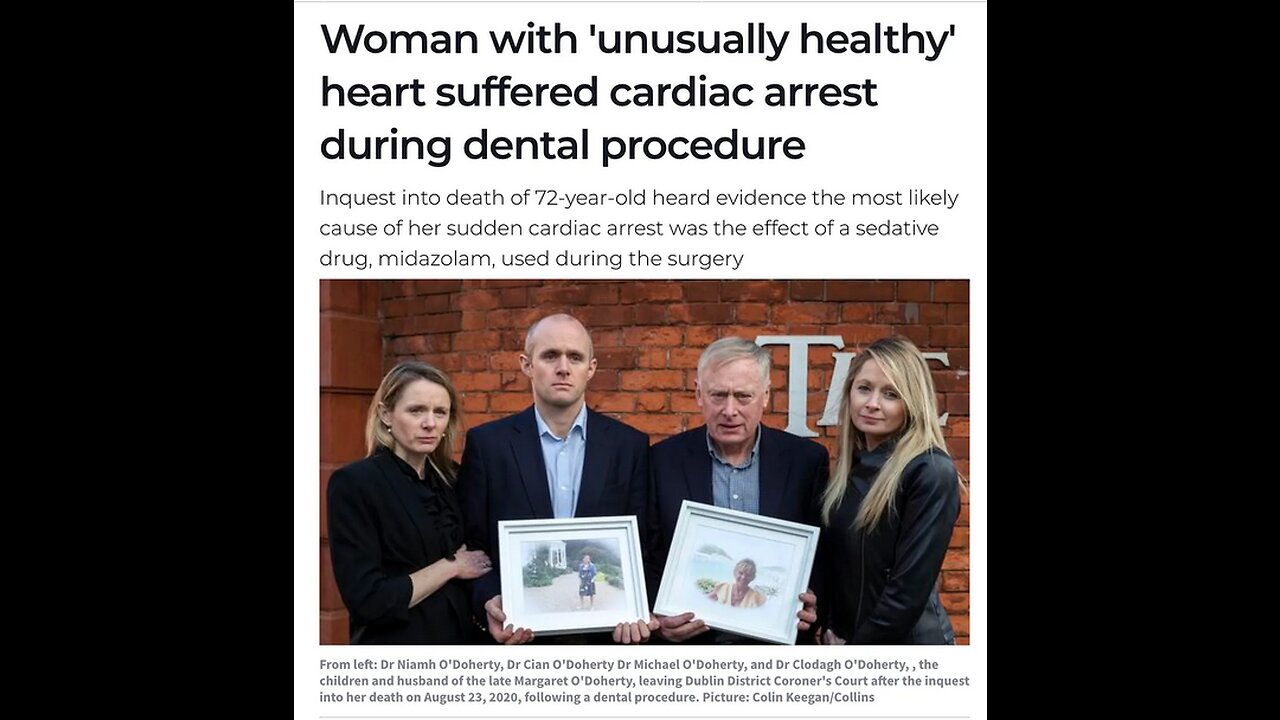Premium Only Content

Crimes against Humanity...
IRELAND'S DEATH ROW MIDAZOLAM DOSES INFLICTED ON OUR ELDERLY TO FAKE THE COVID-19 PANDEMIC
With doses as high as 10mg for 'Covid-19' patients, no wonder so many died unnecessarily to create the illusion of a deadly pandemic and to get the public to roll up their sleeves...Ten milligrams of midazolam for a 79-old-old ‘Covid-19’ patient in Dublin’s Tallaght Hospital - the same dose given to Death Row inmate Denis McGuire in Ohio as part of his 2014 execution for the rape and murder of a pregnant woman. The controverisal drug was used in combination with hydromorphone. According to an article in The Guardian newspaper on January 16, 2014 it was, by all accounts, a slow and painful death, taking 25 minutes to kill the 53-year-old prisoner:
"His lawyers had warned ahead of the proceeding that the experimental combination of the sedative midazolam and painkiller hydromorphone might subject him to “air hunger”, an insufficient flow of air into the lungs causing the sensation of suffocation".
In court proceedings last week, an Ohio state prosecutor said bluntly: “You're not entitled to a pain-free execution,” and a judge allowed the execution to proceed. According to a BBC report on lethal injections for capital punishment from March 5, 2018, midazolam was feared by hardened criminals on Death Row.
The drug midazolam – a sedative used by several states to cause unconsciousness – has proved so controversial that, in 2017, Alabama inmate Thomas D Arthur asked to be executed by firing squad. Arthur lodged an appeal with the Supreme Court to postpone his execution on the basis that midazolam, one of the drugs in Alabama’s three-drug lethal injection combination, could contribute to ‘prolonged torture’. The Supreme Court denied the appeal, and Arthur was executed (by lethal injection) in May 2017.
Ireland’s Health Products Regulatory Authority (HPRA) says Do Not Take Midazolam If:
• You are allergic (hypersensitive) to midazolam or any of the other ingredients of the medicine (listed in section 6).
• You are allergic to other benzodiazepine medicines, such as diazepam or nitrazepam. • You have severe breathing problems and you are going to have midazolam for conscious sedation.
You must not be given midazolam if any of the above apply to you. If you are not sure, talk to your doctor or pharmacist or nurse before you are given this medicine.
So why was midazolam used so liberally in Ireland to treat a respiratory illness if medics were officially advised NOT to use it for ‘severe breathing problems’?
According to the HPRA, possible side effects include:
• Anaphylactic shock (a life-threatening allergic reaction). Signs may include a sudden rash, itching or lumpy rash (hives) and swelling of the face, lips, tongue or other parts of the body. You may also have shortness of breath, wheezing or trouble breathing.
• Heart attack (cardiac arrest). Signs may include chest pain. • Muscle spasm around the throat, causing choking. Life-threatening side effects are more likely to occur in adults over 60 years of age and those who already have breathing difficulties or heart problems, particularly if the injection is given too fast or at a high dose.
On January 13, 2023, The Irish Examiner ran a story about a woman who died from a heart attack while undergoing a routine procedure at a dental clinic. The coroner’s inquest returned a verdict of medical misadventure, putting her death down to the use of midazolam as the ‘most likely cause of her sudden cardiac arrest’. It is obvious we need to talk about midazolam, the dosages used on Irish patients during the so-called ‘pandemic’ and how it effected their breathing and ultimately their ability to survive.
We need to study the medical records of those who died ‘with Covid’ and ask if midazolam was a factor in their deaths.
It is a matter of grave public importance that we understand this Death Row drug and why it became the favoured choice of medication for patients with a respiratory illness in Ireland and across the world during the so-called pandemic. Many watching will know someone who appears to be suffering a serious adverse reaction, or perhaps recognise apparent symptoms in themselves.
-
 3:10:03
3:10:03
Mally_Mouse
14 hours agoSpicy Saturday!! - Let's Play: Lockdown Protocol w/Friends!
400K11 -
 LIVE
LIVE
Major League Fishing
3 days agoLIVE! - Bass Pro Tour: Heavy Hitters - Day 1
1,538 watching -
 8:00:02
8:00:02
SpartakusLIVE
14 hours agoWZ Solos || #1 Challenge MASTER brings you Saturday SPARTOONS
70.9K1 -
 9:05:51
9:05:51
Spartan (Pro Halo esports Player)
16 hours agoNo Scrims today so Ranked for a bit then SWTOR
59.4K2 -
 58:42
58:42
Sarah Westall
16 hours ago500 Vaccine Schedule, WHO & UN Deception, Cyborg Depopulation Agenda w/ Dr. Rima Laibow
91.1K52 -
 9:15
9:15
The Art of Improvement
2 days agoThe Power of Micro-Goals
42.6K3 -
 16:16
16:16
megimu32
23 hours agoKerplunk Unboxing: Loud, Chaotic & Definitely a Sibling Trap
29.4K19 -
 22:55
22:55
marcushouse
1 day ago $1.77 earnedStarship’s Flight Plan Just Took an Unexpected Turn!
24.4K9 -
 1:29
1:29
Memology 101
1 day ago $2.68 earnedShe just SNITCHED on her ENTIRE party…😂😂😂
19.5K19 -
 4:53:29
4:53:29
IcyFPS
14 hours agoDOOM x WARZONE | Chapters 9-14 | LETS GO!! | Direct RTMP |
13.6K1